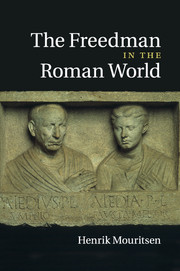Book contents
7 - The freedman (and his son) in public life
Published online by Cambridge University Press: 21 January 2011
Summary
Roman public life was – as a matter of course – dominated by men of means. The rich monopolised all positions of status and influence, and, as we have seen, some freedmen (a very small minority, no doubt) became not just comfortable but conspicuously well off. Their blanket exclusion from positions of authority therefore produced a glaring case of ‘status dissonance’, that is, a clash between different parameters of social standing, in this case wealth and personal background. The taboo against former slaves exercising public authority was absolute and non-negotiable, justified as it was by the natural order that dictated that higher beings govern the lower. As a result, freedmen were excluded from the entire honours system, including magistracies, priesthoods, the senate, the equestrian order, the law courts, and the local town councils. The fact that the bar on freedmen in the ordo decurionum apparently was enshrined in law only in 24 ce is of little import in this context since the lex Visellia merely formalised an existing de facto exclusion. Although the ban on rich freedmen pursuing careers severed the normal association between wealth, rank, and power, certain aspects of the public honours system remained open to them. Thus, the ornamenta, i.e. the outer symbols of rank and office, were occasionally bestowed on particularly deserving freedmen as a means of negotiating the paradox of rich citizens without a matching status.
- Type
- Chapter
- Information
- The Freedman in the Roman World , pp. 248 - 278Publisher: Cambridge University PressPrint publication year: 2011



